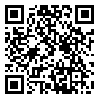Volume 9, Issue 3 (11-2023)
فصلنامه تحقیقات بنیادین علوم انسانی 2023, 9(3): 136-136 |
Back to browse issues page
Download citation:
BibTeX | RIS | EndNote | Medlars | ProCite | Reference Manager | RefWorks
Send citation to:



BibTeX | RIS | EndNote | Medlars | ProCite | Reference Manager | RefWorks
Send citation to:
Karimi M. Feasibility of Quran-based humanities. فصلنامه تحقیقات بنیادین علوم انسانی 2023; 9 (3) :136-136
URL: http://frh.sccsr.ac.ir/article-1-566-en.html
URL: http://frh.sccsr.ac.ir/article-1-566-en.html
Abstract: (2443 Views)
Humanities is a collection of knowledge that deals with Knowing human and describes, explains and interprets individual and social phenomena and gives direction to human actions and inactions. The existing human sciences have been formed based on non-divine foundations and from non-religious sources and have not been very successful in bringing people to happiness, especially in Islamic societies; Therefore, it is necessary to produce Islamic humanities, especially Quran-based humanities. The production of human sciences is based on certain foundations that must be substantiated. One of those fundamentals is the possibility of producing Quran-based human sciences. This article researches the problem of "possibility of Quran-based humanities" in a descriptive-analytical way with the aim of establishing the context for the production of Quran-based humanities.
Research findings: 1. The evidence shows that, firstly, humanities are part of the Qur'an's domain; Secondly, the Qur'an has the necessary expression efficiency for the production of human sciences; 2. Extratextual methods such as "the method of human expectation from the Qur'an" and "the method of introspection" and "expanding the historical experience of the Qur'an" are insufficient and cannot be used to minimize the scope of the Qur'an and consider human sciences outside the scope of the Qur'an; 3. The language of the Qur'an is not customary or coded or merely normative, which cannot have the necessary efficiency for the production of human sciences based on the Qur'an.
Research findings: 1. The evidence shows that, firstly, humanities are part of the Qur'an's domain; Secondly, the Qur'an has the necessary expression efficiency for the production of human sciences; 2. Extratextual methods such as "the method of human expectation from the Qur'an" and "the method of introspection" and "expanding the historical experience of the Qur'an" are insufficient and cannot be used to minimize the scope of the Qur'an and consider human sciences outside the scope of the Qur'an; 3. The language of the Qur'an is not customary or coded or merely normative, which cannot have the necessary efficiency for the production of human sciences based on the Qur'an.
| Rights and permissions | |
 |
This work is licensed under a Creative Commons Attribution-NonCommercial 4.0 International License. |






